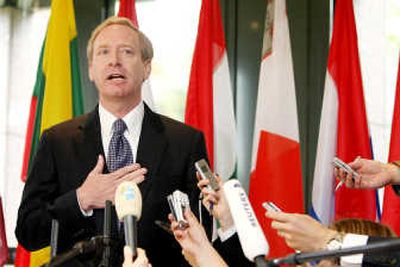EU antitrust ruling upheld against Microsoft

BRUSSELS, Belgium – The European Union’s second-highest court affirmed the EU’s nine-year pursuit of Microsoft Corp., rejecting the software maker’s appeal and strengthening the bloc’s hand as it pushes ahead with cases against other major technology companies.
The European Court of First Instance ruled Monday the European Commission was correct in concluding that Microsoft used its dominance in desktop computers to muscle into server software and media players in the 1990s – and that Microsoft still poses similar threats.
It also upheld the record 497 million euro ($613 million) fine imposed on the company in 2004 – the largest ever levied by EU regulators.
The resounding victory for the EU – successful on all but one point – cements Europe’s role as the lead international regulator of market-dominant companies around the world. The EU persisted with its case against Microsoft even as the U.S. Justice Department settled in 2001 and many of the original plaintiffs dropped out.
“In global markets, the antitrust policy that matters is the most restrictive one,” said M.J. Moltenbray, a partner at Freshfields Bruckhaus Deringer LLP.
In the past two months, EU regulators have charged Intel Corp. and Rambus Inc. with antitrust abuse. This week, it will hold closed hearings in which Apple Inc. will defend itself against allegations that it restricts customer choice with separate national iTunes stores. And Google Inc. will soon have to seek EU approval to take over DoubleClick Inc., a deal some rivals claim will give Google too much power over personal data and online ads.
“The decision very clearly gives the Commission quite broad power and discretion,” Microsoft lawyer Brad Smith said. “There are many companies in our industry that have a very large market share.” He added that the 248-page ruling would actually affect “every other industry in the world.”
In Washington, Assistant Attorney General Thomas O. Barnett said the European ruling “may have the unfortunate consequence of harming consumers by chilling innovation and discouraging competition.”
“In the United States, the antitrust laws are enforced to protect consumers by protecting competition, not competitors,” he said in a statement.
“In the absence of demonstrable consumer harm, all companies, including dominant firms, are encouraged to compete vigorously.”
EU Competition Commissioner Neelie Kroes was dismissive of “scare stories” that the court decision would herald disaster for technology companies wanting to protect their innovations.
“There is one company that will have to change its illegal behavior as a result of this ruling: Microsoft,” she said.
She added that Monday’s victory was “bittersweet” because customers have no more choice than they did three years ago when Microsoft was originally fined.
Kroes refused to say what implications Monday’s decision would have on other legal fights between the EU and Microsoft, particularly one related to its recently released Windows Vista operating system.
Microsoft’s rivals have raised issues with Vista’s bundled security software, its integrated Internet and desktop search, and digital rights management tools used to protect copyrights.
The Court of First Instance’s overwhelming endorsement of the Commission’s monopoly-abuse case against Microsoft is a massive boost for the officials in Brussels who took on one of the world’s most powerful companies.
“They will certainly gain significant confidence and continue to be very aggressive,” said Ted Henneberry, a former Irish regulator and lawyer with Heller Ehrman LLP.
The 13 judges on the Luxembourg-based Court considered Microsoft’s appeal for 15 months.
The case started in the 1990s with complaints from Microsoft’s U.S.-based rivals – including Sun Microsystems Inc. and RealNetworks Inc. – about how the software giant used its presence on most desktop computers to elbow into new markets and block competitors.
Microsoft Windows operating system runs as much as 95 percent of the world’s PCs.
On March 24, 2004, the European Commission found Microsoft guilty, ordering it to share the code that would help rivals’ servers work better with Windows and make a version of its operating system available without its media player software. It also levied the record-setting fine, which Microsoft paid.
Microsoft now has two months to decide whether it will appeal to the EU’s highest court. The company said it needed to consider the ruling before it decided how to proceed.